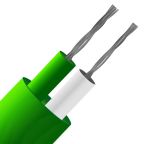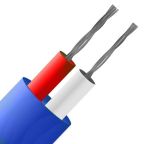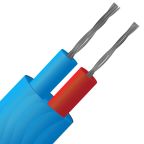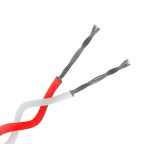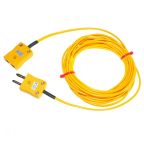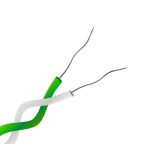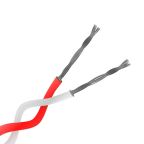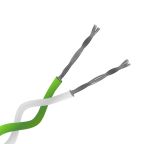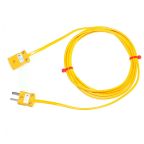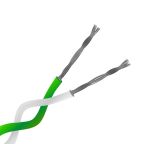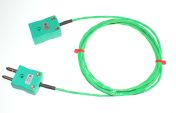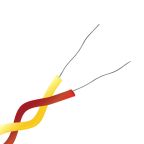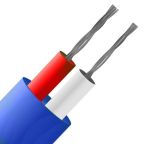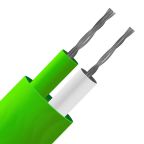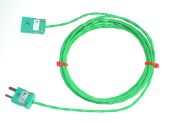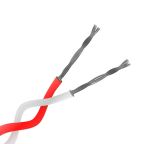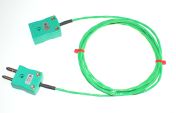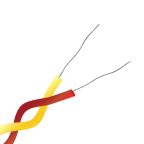Thermocouple & Extension Wire
Thermocouples are essential temperature sensors widely used in industrial applications. Their accurate performance depends heavily on the correct selection and installation of thermocouple extension wire.
Discover our extensive range of high-quality thermocouple and extension wires designed for precise and reliable temperature measurement across industrial and laboratory applications. Whether you need durable cables for harsh environments or flexible wiring solutions for process control, RS offers trusted products from leading manufacturers to meet your exact specifications.
What Is Thermocouple Extension Wire?
Thermocouple extension wire is a specialised cable that extends the thermocouple signal from the sensor probe to a measuring instrument. It is made from alloys with thermoelectric properties closely matching the specific thermocouple type.
This matching is critical as it effectively extends the thermocouple's reference (cold) junction to the instrument, thereby preserving signal integrity and measurement accuracy by minimising thermal EMF errors over distance that would occur if standard copper wire were used.
What Is Thermocouple Extension Wire Made From?
Extension wire alloys are engineered to mirror the thermoelectric characteristics of the thermocouple elements (e.g., Type K uses Chromel/Alumel conductors). While "thermocouple grade" wire is used for the sensor itself, "extension grade" wire provides a similar thermoelectric response within specified temperature limits, which may be broader than compensating wire.
For cost-effectiveness over long distances, "compensating wires," made from alternative alloys, may be used. These mimic the thermocouple's voltage output over a more restricted temperature range, typically near ambient; use outside this range will introduce errors.
Why Use Thermocouple Extension Wire?
Employing thermocouple extension wire is crucial for two primary reasons. Firstly, it enables remote placement of sensitive instrumentation away from harsh process environments, such as extreme heat, corrosive atmospheres, or high vibration, enhancing accessibility and protecting electronics.
Secondly, it prevents significant cold junction errors and signal inaccuracies. Standard copper wire would create new, uncompensated thermoelectric junctions, but extension wire uses matched materials, effectively moving the reference junction to the instrument where its temperature is measured and compensated, thus maintaining measurement fidelity.
Types of Thermocouple Extension Wires
Extension wires are specific to thermocouple types, ensuring accurate signal transmission. Each type is designed to match the thermoelectric properties of its corresponding thermocouple.
Type K (Chromel/Alumel)
For general-purpose applications, compatible with Type K thermocouples. K Type thermocouple extension wire is widely used due to its broad temperature range and good oxidation resistance at higher temperatures (e.g., heat treating, kilns, exhaust gas measurement).
Type J (Iron/Constantan)
Used with Type J thermocouples, typically in lower-temperature, non-moist environments (e.g., plastics processing, die casting). The iron conductor is prone to oxidation if not protected, which can affect accuracy over time.
Other Specialised Types
- Type T (Copper/Constantan): Ideal for cryogenic/low-temperature applications and food processing, offering high accuracy and good stability in moist conditions.
- Type E (Chromel/Constantan): Provides the highest EMF output per degree Celsius, making it suitable for applications requiring high sensitivity or resolution.
- Type N (Nicrosil/Nisil): Offers superior stability and resistance to oxidation at high temperatures compared to Type K, often used in heat treatment and metallurgical furnaces.
- Types R & S (Platinum-Rhodium/Platinum): These noble metal extension (or compensating) wires are for extremely high-temperature applications (e.g., glass, semiconductor manufacturing) offering excellent stability.
Extension Wire vs. Compensating Wire
Extension wires closely match thermocouple alloys and can often tolerate a wider range of temperatures along their path. Compensating wires use different, cost-effective alloys that provide a similar thermoelectric response but only over a restricted ambient temperature range, meaning they must be routed through areas where temperatures do not significantly exceed these limits.
How to Choose the Right Thermocouple Extension Wire
Accurate temperature measurement relies on correct extension wire selection, considering several key factors.
Compatibility with Thermocouple Type
The extension wire type, denoted by a letter code (e.g., KX, JX), must match the thermocouple type. Mismatches introduce spurious thermoelectric voltages, leading to significant and unpredictable measurement errors.
Operating Temperature Range
Insulation and sheath materials must withstand the maximum and minimum ambient temperatures the wire will encounter along its entire length. Degradation of insulation can lead to signal shorts or leakage.
Insulation Material
Select based on environmental conditions, chemical exposure, and temperature:
- PVC (Polyvinyl Chloride): Economical and flexible, for moderate temperatures, general-purpose use with minimal chemical/abrasion exposure.
- Teflon (PTFE/FEP): Excellent chemical/moisture resistance, wider operating temperature range, and good for clean environments.
- Fibreglass: Suited for high-temperature applications, providing good thermal stability but may require a moisture barrier.
- Ceramic Fibre: Used for extremely high-temperature environments, offering exceptional thermal insulation, though less flexible.
Distance of Transmission and Shielding
For long distances or in electrically noisy environments (near motors, VFDs), use shielded thermocouple extension cables. The shield intercepts EMI and, when grounded (typically at the instrument end only), drains this noise, protecting the low-level millivolt signal.
Industrial Applications of Thermocouple Extension Wires
Extension wires are critical across numerous industrial sectors, facilitating precise temperature monitoring in a wide range of applications.
- Manufacturing and Foundries: Used for monitoring extreme temperatures in kilns, furnaces for heat treatment, and metal melting processes. They are also essential for controlling barrel and mould temperatures in plastic injection moulding and ensuring correct material temperatures during welding preheat and PWHT.
- Power Generation: Critical for transmitting temperature data from boilers, turbines (steam lines, bearings), and exhaust gas systems. This monitoring is vital for operational efficiency, predictive maintenance, and ensuring compliance with emissions control regulations.
- Chemical Processing: Essential for controlling temperatures in reaction vessels to ensure process safety and product purity. They are also used to monitor temperatures in heat exchangers and distillation columns for optimal energy efficiency and process stability.
- Food and Beverage: Widely used to monitor precise temperatures in ovens, refrigeration systems, and pasteurisation or sterilisation (autoclave) processes. This ensures consistent product quality, food safety, and compliance with regulatory standards like HACCP.
The Leading Supplier and Distributor of Thermocouple Extension Wires in Malaysia
RS is your trusted partner for high-grade thermocouple extension wire. We maintain a comprehensive inventory from reputable manufacturers like Prosensor, Jumo, and our own RS PRO line. Our selection spans various thermocouple calibrations (such as Type K, J, T, N, and E), diverse insulation materials including PVC, PFA, and Fibreglass, and a range of conductor sizes, ensuring you secure the optimal extension wire for your precise industrial, process control, or laboratory applications.
To complete your temperature sensing and monitoring solutions, we also stock an extensive assortment of essential components, including thermocouple sensors, temperature controllers, and advanced temperature monitoring instrumentation. Procure the specific thermocouple extension wire you need, from general-purpose to high-performance specifications, alongside all compatible accessories online with RS today. For comprehensive information regarding our ordering procedures, delivery options across Malaysia, and any associated fees, please consult our dedicated delivery information page.
